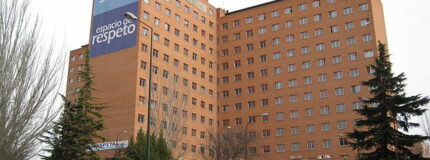How to contact the center
Full member
HCP Center

The main potential of this provider is the collaboration with the IOBA (Eye Institute) of the University of Valladolid supported by framework and specific agreements between the Regional Health Service (Sacyl) and the University.
One of the strengths of this union is its research capacity, reaching an excellence level. Thus the IOBA is oriented towards translational research in Vision Sciences whose first recipients are patients of the Hospital Clinico Universitario. Besides, the IOBA has the advantage of having low vision services, which are outside the portfolio of the National Health System.
Also this provider is in touch with the “National Observatory of Ocular Rare Diseases”, founded by 24 Spanish patients’ organizations with its official site at the University and working together with the National Rare Diseases Registry of the National Carlos III Institute of Health.The main objective of this new healthcare model is to incorporate patients’ perspective into the healthcare system, so that their care is comprehensive and coordinated, and so that they can assume a stronger role and greater responsibilities in the management of their illness.On the other hand, an essential competitive advantage of the Hospital Clinico Universitario is its quality as a "clinical" hospital since, due to its solid union between the academic and healthcare functions, it constitutes an excellent environment for teaching how to learn, for innovation and research. The Ophthalmology Department of the Hospital houses two ophthalmic national reference units of the National Health System, being a unique institution at the Castilla and Leon Region. This fact has greater relevance in Valladolid with the IOBA and the Faculty of Medicine, the oldest in Spain, and its prestigious heritage.For this reason, we are working in a research institute in Valladolid hospitals, with the support of excellence groups and with the help of the Ministry of Health and the Regional Health Service (Sacyl), to enhance the quality of biosanitary research and advance in its positioning nationally and internationally.Excellence, leadership, innovation, teamwork and entrepreneurial spirit are values that permeate the health organization of Castilla y León and from the Hospital Clinico Universitario de Valladolid, and the IOBA we work with enthusiasm and illusion to enhance and increase them.
Picture : Rodelar
One of the strengths of this union is its research capacity, reaching an excellence level. Thus the IOBA is oriented towards translational research in Vision Sciences whose first recipients are patients of the Hospital Clinico Universitario. Besides, the IOBA has the advantage of having low vision services, which are outside the portfolio of the National Health System.
Also this provider is in touch with the “National Observatory of Ocular Rare Diseases”, founded by 24 Spanish patients’ organizations with its official site at the University and working together with the National Rare Diseases Registry of the National Carlos III Institute of Health.The main objective of this new healthcare model is to incorporate patients’ perspective into the healthcare system, so that their care is comprehensive and coordinated, and so that they can assume a stronger role and greater responsibilities in the management of their illness.On the other hand, an essential competitive advantage of the Hospital Clinico Universitario is its quality as a "clinical" hospital since, due to its solid union between the academic and healthcare functions, it constitutes an excellent environment for teaching how to learn, for innovation and research. The Ophthalmology Department of the Hospital houses two ophthalmic national reference units of the National Health System, being a unique institution at the Castilla and Leon Region. This fact has greater relevance in Valladolid with the IOBA and the Faculty of Medicine, the oldest in Spain, and its prestigious heritage.For this reason, we are working in a research institute in Valladolid hospitals, with the support of excellence groups and with the help of the Ministry of Health and the Regional Health Service (Sacyl), to enhance the quality of biosanitary research and advance in its positioning nationally and internationally.Excellence, leadership, innovation, teamwork and entrepreneurial spirit are values that permeate the health organization of Castilla y León and from the Hospital Clinico Universitario de Valladolid, and the IOBA we work with enthusiasm and illusion to enhance and increase them.
Picture : Rodelar
Contact
Hospital Clinico Universitario de Valladolid, Spain
Av. Ramón y Cajal, 3
47003 Valladolid
Spain
Team

Dr Salvador Pastor-Idoate
Representative
Spain
National Integration (TWG9), Pediatric Ophthalmology Rare Diseases (WG3), Registries & Epidemiology (TWG7), Research (TWG8), Retinal Rare Eye Diseases (WG1)

Dr Jose Maria Herreras-Cantalapiedra
Spain
Anterior Segment Rare Eye Diseases (WG4), National Integration (TWG9), Registries & Epidemiology (TWG7), Research (TWG8)

Dr Lidia Cocho Archiles
Spain
Anterior Segment Rare Eye Diseases (WG4), National Integration (TWG9), Registries & Epidemiology (TWG7)

Pr Rosa Coco
Spain
Genetic Diagnostics (TWG6), National Integration (TWG9), Registries & Epidemiology (TWG7), Research (TWG8), Retinal Rare Eye Diseases (WG1)

Dr Ruben Cuadrado Asensio
Spain
Low Vision Daily Life and Patients Groups (TWG5), National Integration (TWG9)

Dr Maria Isabel Lopez Galvez
Spain
National Integration (TWG9), Retinal Rare Eye Diseases (WG1)

Dr Laura Mena Garcia
Spain
Low Vision Daily Life and Patients Groups (TWG5), Neuro-Ophthalmology Rare Diseases (WG2), Research (TWG8)

Dr Marta Para Prieto
Spain
National Integration (TWG9), Neuro-Ophthalmology Rare Diseases (WG2)

Dr Juan Jose Telleria Orriols
Spain
Genetic Diagnostics (TWG6), National Integration (TWG9), Registries & Epidemiology (TWG7), Research (TWG8)

